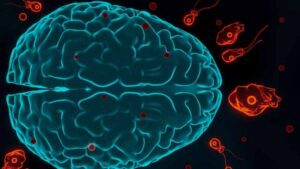
(stock image)
A recent study suggests that incorporating a small portion of peanuts into a daily diet may help reduce the risk of dementia in older adults. Conducted by researchers in Australia, the study indicates that eating nuts every day may preserve and even enhance cognitive abilities, offering a promising dietary solution for age-related cognitive decline. told by The Mirror.
Nuts for Cognitive Health
The research team analyzed data from more than 4,800 Chinese adults aged 55 and above, revealing a significant connection between nut consumption and improved mental functioning. The findings showed that individuals who ate over 10 grams of nuts daily—equivalent to two teaspoons—experienced “positively associated” benefits for their cognitive health, including better memory, reasoning, and thinking skills.
Dr. Ming Li, the lead researcher from the University of South Australia, explained that this was the first study to link nut consumption with cognitive performance in older Chinese adults. Highlighting the urgent need for solutions to rising dementia rates, Dr. Li shared: “By eating more than 10 grams—or two teaspoons—of nuts per day, older people could improve their cognitive function by up to 60 percent compared to those not eating nuts, effectively warding off what would normally be experienced as a natural two-year cognition decline.”
Peanuts as a Potential Game-Changer
The study drew upon 22 years of data from the China Health Nutrition Survey, revealing that about 17 percent of participants regularly consumed nuts, particularly peanuts. Dr. Li emphasized peanuts’ unique health benefits, noting that they contain anti-inflammatory and antioxidant properties that help reduce cognitive decline over time.
“Nuts are known to be high in healthy fats, protein, and fiber with nutritional properties that can lower cholesterol and improve cognitive health,” Dr. Li noted. “While there is no cure for age-related cognitive decline and neurodegenerative disease, variations in what people eat are delivering improvements for older people,” she added.
Hope for Age-Related Cognitive Health
As people age, changes in reasoning, memory, and processing speed are often unavoidable aspects of the aging process. According to Dr. Li, “Age is also the strongest known risk factor for cognitive disease.” However, the study offers hope that even modest dietary adjustments, like incorporating peanuts, could help older adults retain their cognitive independence for longer. report from CNN.
“If we can find ways to help older people retain their cognitive health and independence for longer—even by modifying their diet—then this is absolutely worth the effort,” Dr. Li stated. By focusing on dietary changes that support cognitive health, the study suggests that older adults could potentially mitigate some of the natural declines associated with aging.
For those interested in simple, effective dietary strategies to support brain health, peanuts may offer an affordable and accessible option that contributes to cognitive well-being.


